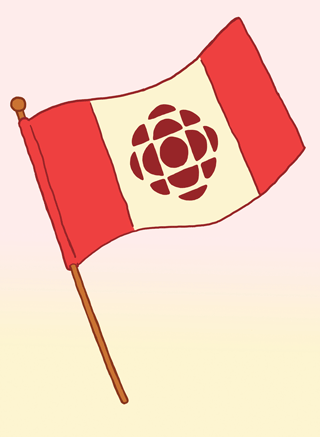The CBC has been hobbled.
Decades of funding cuts under both the Liberal and Conservative governments and political interference through board appointments by Stephen Harper have severely hampered the national broadcaster’s ability to meet its mandate: to “provide radio and television services incorporating a wide range of programming that informs, enlightens and entertains,” according to the 1991 Broadcasting Act.
The government’s 2012 budget alone cut the CBC’s budget by $115 million over the next three years. In mid-April the job losses in the past year numbered over 1,400 across the country including 23 in Manitoba in the last round of cuts.
And now, under increasing financial pressure, the broadcaster has announced plans to sell off all of their property across the country with the intent to move or lease back any working space required for their own operations.
Stephen Harper has continued to deny that any cuts have even taken place, saying the government hasn’t cut the CBC’s budget and that any problems they’re facing are the result of a loss of viewers. The Conservative Party has simultaneously painted the CBC as a haven for liberal elites and party enemies in order to rally the base and raise funds.
The hack-and-slash approach to public services is a common first-step in neoliberal privatization efforts – something we can simultaneously see occurring with Canada Post. First the public services are cut and reduced ensuring quality drops and then as dissatisfaction with the level of services grows the public services can be scrapped altogether and replaced by private, profit-driven providers.
Future prospects
Friends of Canadian Broadcasting worked to make funding for the CBC and an end to political interference priorities in the election, effectively putting them amongst other non-profits working to keep the Conservatives from winning the election.
You may have seen their “I vote CBC” yard signs or television commercials. The group conducted sit-down interviews through 2015 with three of the five major party leaders – Thomas Mulcair, Elizabeth May, and Justin Trudeau all participated, while Stephen Harper, Mario Beaulieu, and Gilles Duceppe (the latter two being the Bloq Québécois’s two most recent leaders) didn’t respond to Friends of Canadian Broadcasting’s requests.
In each of their interviews and through other public announcements each party (other than the Conservatives) has made promises regarding how to manage the CBC. The difference between Liberal, NDP, and Green commitments to the CBC are relatively indistinct with each promising to undo the most recent round of cuts, with the Liberals and Greens also promising additional funding.
All three criticized the system under which the prime minister appoints individuals to the board, which has led to nine of the current 11 members being Conservative party donors. The NDP and Green party said if elected they would change the system of governance to reduce political interference and the Liberals said they would review it.
We’ll have to see whether the newly elected Liberal government follows through with their commitments. Some reservations are certainly valid since under Chrétien the Liberals actually imposed about $400 million in cuts to the CBC in the 90s, but if they hold to their promises this time around the future is likely to be much brighter for the broadcaster.
That’s good news, because in the final days of the election some of the other major players in Canadian media began to show their true colours – pointing out a dark truth about the state of our national media: it’s not ours.
The media landscape
The Globe and Mail is currently under fire for their awkward election endorsement. In their pre-election editorial, the Globe and Mail endorsed the Conservative Party while criticizing Stephen Harper and calling for a change in leadership.
People have been showing their contempt using the hashtag #MoreGlobeEndorsements, offering mockery with endorsements such as “I endorse the Globe but not the Mail,” “The News, but not Huey Lewis,” and “Mordor, but not Sauron.”
Endorsing the party and not the leader is laughable for a number of reasons, not least of which the fact that Harper has been the only person elected to lead the party since it was formed in 2003 through a merger of the Reform and Progressive Conservative parties, meaning there is no Harperless Conservative Party for us to know and look back on affectionately. The Conservative Party we’ve had is the only Conservative Party there has ever been – although since Harper announced his plan to resign his leadership it looks like we’ll have a chance to find out what a Harperless Conservative Party does look like.
The Globe and Mail’s editor-in-chief David Walmsley said that the decision of the endorsement was his own but that he had talked to the publisher about it first. This was a change from the process that was used for the paper’s controversial 2014 provincial endorsement of Ontario Conservative leader Tim Hudak. The Hudak endorsement was the result of a last minute override by Walmsley after the editorial board went through a lengthy process to collectively decide on endorsing Liberal leader Kathleen Wynne.
Postmedia Network Inc. – the largest publisher of English-language daily newspapers in Canada, which owns the National Post (Canada’s only other national daily newspaper), the Calgary Herald, Edmonton Journal, Ottawa Citizen, Windsor Star, Montreal Gazette, and a variety of locally tailored Sun newspapers, among others – are also facing criticism for their endorsement of Harper. The Edmonton Journal’s columnist Paula Simons stated that the decision for the Journal to endorse Harper was made by the paper’s owners as opposed to its editors.
On Friday, independent news outlet CANADALAND reported that Andrew Coyne, comment and editorial editor for the Postmedia’s flagship publication the National Post, had signed off on running the company’s editorial but that he had planned on running his own article with a separate endorsement – which Coyne later confirmed was for the NDP. However, CANADALAND stated that Coyne’s article had been nixed. Since then Coyne has announced his resignation as editor but explained that he would be staying on as a columnist.
In the week before the election our own Postmedia paper, the Winnipeg Sun, ran hackneyed, owner-inspired editorials such as “Our choice is clear – Stephen Harper,” and “No change best change,” on top of equally unpalatable but more conventionally issue-oriented pieces such as “Maternity leave extension flawed,” which argued against an extension of Canada’s parental leave, calling it “a non-starter.” This is a position that could only be taken by a person who has to pay for the parental leaves of others.
It’s ironic to see flagship Canadian media outlets calling for four more years of Conservative leadership considering the party has been so antagonistic towards the media, particularly during the election.
The endorsements ring particularly hollow as polling (along with the actual election results) consistently showed the majority of Canadians wanted Harper and his party gone. The awkward gap between the will of the public and the will of the few individuals who own a majority of our media outlets is rarely exposed in such transparent terms.
We’ve seen a high turnout in this election. People have shown their disapproval of the current regime by calling for a new government. But if people are concerned about who’s running their government they should be equally concerned about who’s running their media. It’s a narrowing few with similar tastes.
The model we’ve used to fund the majority of our media has led to an effective monopoly by a select corporate class and these endorsements have shown that when they want us to think something they’re willing to interfere in the editorial process to make it happen.
It’s not enough to have a national broadcaster alone – maybe we should start exploring other options in community-owned media. But in the meantime, thank God for the CBC.



